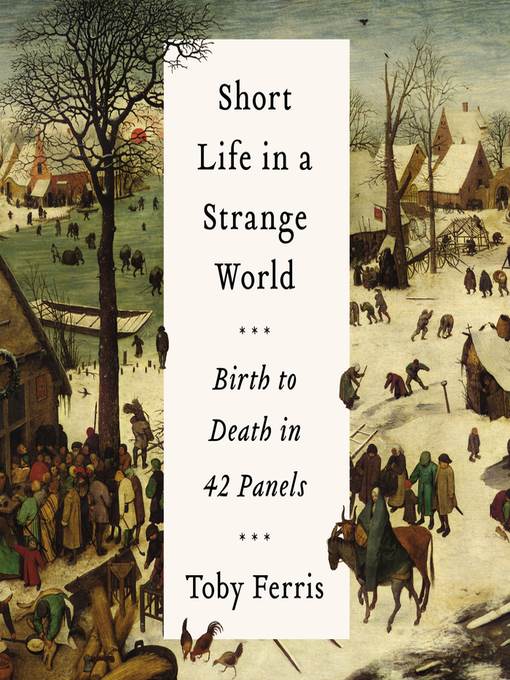
Short Life in a Strange World
Birth to Death in 42 Panels
کتاب های مرتبط
- اطلاعات
- نقد و بررسی
- دیدگاه کاربران
نقد و بررسی

November 25, 2019
Ferris, creator of the Anatomy of Norbiton online series of essays inspired by Renaissance art, blends memoir with philosophic meditation on art criticism in his thoughtful debut. In 2012, shortly after his father dies and leaves behind journals full of blank pages—a metaphor of a “life unfulfilled’—the largely unemployed Ferris embarks on a 19-city international tour to see all 42 paintings by Dutch Renaissance painter Pieter Bruegel the Elder, to create something meaningful in his own life. But this is not a straightforward travelogue; by examining life through Bruegel’s “ethnographic eye,” Ferris seeks relief from middle-aged uncertainties: while viewing The Census at Bethlehem in Brussels, he thinks, “We make spreadsheets, trace genealogies, embark on projects, write essays. All this must and will be made to mean something.” Throughout his three-year tour, Ferris finds elements within the paintings that fuel ruminations on his father’s death, which he saw as “a temporary loss of our own identity.” As time passes, he becomes only more uncertain: while studying Bruegel’s several detailed crowd scenes, Ferris concludes “one of us is lost in a crowd.” By book’s end, he realizes “I do not know if I became my father, simply because I do not know who my father was—what those blank pages might have contained.” Ferris shows a gifted eye for detail throughout, and fans of Renaissance art will appreciate his thought-provoking insight.

November 15, 2019
An obsession with Pieter Bruegel the Elder elicits a vibrant portrait of the artist's work and world. Ferris, creator of the web-based Anatomy of Norbiton, which he describes as "essays on suburban life and universal failure as seen through the lens of Renaissance art," makes his book debut with a captivating chronicle of his journeys to collections around the world in search of paintings by Bruegel. In 2012, the 42-year-old author became overwhelmed by "a mania for Bruegel," incited by Landscape With the Fall of Icarus--not an authentic Bruegel, he discovered, but more likely a copy--which he saw at the Musée des Beaux Arts in Brussels. "Why Bruegel?, why all of it? and why now?": Ferris never fully answers those questions as he embarks on his quest, revealing only that at the time he felt at loose ends, "on the payroll of a dying software company," and working mostly at home, tinkering with Anatomy of Norbiton. Tracking down works by Bruegel gave him "a defined and manageable project." Ferris does not explain why he juxtaposes his insights into Bruegel's work with a memoir about his father, an engineer who worked for the General Electric Company and who died in 2009. The author portrays his father with affection but strains to connect him to Bruegel. Documentary evidence for his father's life is scant, Ferris admits, consisting of a few methodically kept lists; similarly, for Bruegel, there is "only the vivid remnant flesh of the paintings and drawings and engravings." The author illuminates those works with an astute, knowing eye and penetrating insight, admiring Bruegel's precision in rendering scenes of peasant life: "the marginalized, the outcast, the strange," whom the artist depicted "not necessarily with sympathy"; or "the great theatre of suffering," such as bear-baiting, "which kept the sixteenth century amused." Along with reflections on artworks, Ferris shares sharp, often amusing details of ambience, hotels, trains, meals, and much beer in each city he visits. A profusely illustrated, deeply thoughtful meditation on art.
COPYRIGHT(2019) Kirkus Reviews, ALL RIGHTS RESERVED.

Narrator Jot Davies lends his beautifully resonant voice to this interesting personal memoir. Author Toby Ferris had a mission: to view in person every existing painting by the Northern Renaissance painter Pieter Bruegel the Elder. While on his journey across Europe and the U.S., he relates the subject matter in the Bruegel works to his own life and that of his father. Davies uses a serious tone befitting the somber and reflective quality of the writing. He provides a convincing Dutch accent on occasion and maintains a measured pace, allowing the listener time to view the images provided with the download. Viewing these images is necessary, for the author discusses in detail the characters in everyday village scenes and biblical parables. J.E.S. � AudioFile 2020, Portland, Maine

























دیدگاه کاربران